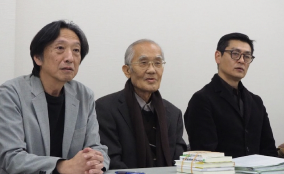On the far right of the photo is Mr. Oyabu, a famous potter, in the center is Mr. Marui, a lawyer specializing in cannabis, and on the left is Mr. Nagayoshi, a writer.
https://cbdlogistics.jp/2024/02/02/an-artist-asks-why-using-cannabis-to-stimulate-creativity-is-a-criminal-offense/
i News UK
Ryujiro Oyabu, a 52-year-old Japanese pottery artist, smoked his first spliff while living in London in the early 2000s.
“That was a wonderful experience,” he remembered. “Living in London is very easy, easier than Tokyo, because you can host a late-night barbecue and make noise but the neighbours don’t care. Sometimes I want to do that here, but Japan is a different culture and the neighbours complain.”
In 2004 in the UK, cannabis was downgraded from a Class B to a Class C drug. Five years later it was promoted back to Class B amid concerns about super-strength “skunk” and links to mental illness. Now, possessing it can lead to up to five years in prison, an unlimited fine, or both.
But back to Japan.
On 8 August, 2021, Mr Oyabu was pulled over by police who found he was carrying three grams of marijuana. The artist immediately admitted it was his and was taken into custody, where he spent three weeks confined to a small cell and suffered panic attacks due to his claustrophobia.
Yet for many Japanese, the greater punishment is not being locked in a cell, but the shame and dishonour of being labelled a drug user.
“Japan is different from Western culture,” explained criminologist Shinichi Ishizuka of Ryukoku University, in Kyoto. “Honesty is the most important value for the Japanese. Punishment isn’t as important as shame – anyone who uses illegal drugs, he is not that human.”
Being a rulebreaker makes it much more difficult for those on the fringes of society to return to normal life. Data shows that nearly half of drug convicts in Japan are recidivists. Mr Oyabu said his experience meant “it became very difficult to do certain projects and show my work in the public view”.
As an artist, he decided to take a stand, enlisting the assistance of constitutional lawyer Hidehiro Marui. Together with his legal team, they argued that since the ban on drugs was made during the American occupation of the country after the Second World War, it was inherently unconstitutional. The court didn’t accept this argument and he was eventually given a six-month sentence in June, suspended for three years.
Since then, Mr Oyabu has appealed the verdict and plans to take the case to the Tokyo High Court based on new laws that allow the drug for medical use. His team are planning to argue that since marijuana is now recognised as a medicine, the government must elaborate further and present scientific evidence of its dangers, by which they hope to undermine the principles behind criminalisation.
“Under the [old law], all medical procedures were prohibited, but by managing THC (tetrahydrocannabinol) under the Narcotics Control Act, it has become possible to use it in medical treatment under certain conditions, just like morphine,” explained journalist Hideo Nagayoshi.
“If that is the case, the government needs to scientifically demonstrate the harmfulness of THC. Ryujiro Oyabu has decided to appeal to the High Court. His legal team plans to ask the government for evidence of the harmfulness of THC.”
If the court accepts their latest argument, the verdict could have implications for the nation’s approach to cannabis. A change in notoriously strict Japan could also prompt countries like the UK to think twice, as opinion polls show a slim majority support legalisation of the drug.
Read more at
https://inews.co.uk/news/world/cannabis-court-case-japan-zero-tolerance-drugs-test-3166758



















